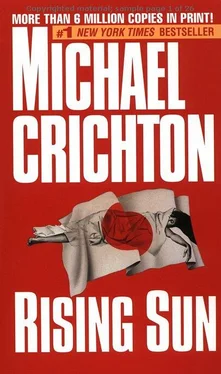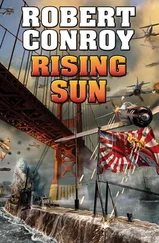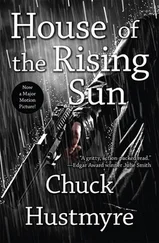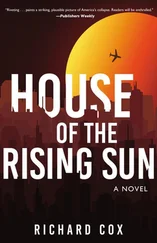Michael Crichton - Rising Sun
Здесь есть возможность читать онлайн «Michael Crichton - Rising Sun» весь текст электронной книги совершенно бесплатно (целиком полную версию без сокращений). В некоторых случаях можно слушать аудио, скачать через торрент в формате fb2 и присутствует краткое содержание. Жанр: Триллер, на английском языке. Описание произведения, (предисловие) а так же отзывы посетителей доступны на портале библиотеки ЛибКат.
- Название:Rising Sun
- Автор:
- Жанр:
- Год:неизвестен
- ISBN:нет данных
- Рейтинг книги:3 / 5. Голосов: 1
-
Избранное:Добавить в избранное
- Отзывы:
-
Ваша оценка:
- 60
- 1
- 2
- 3
- 4
- 5
Rising Sun: краткое содержание, описание и аннотация
Предлагаем к чтению аннотацию, описание, краткое содержание или предисловие (зависит от того, что написал сам автор книги «Rising Sun»). Если вы не нашли необходимую информацию о книге — напишите в комментариях, мы постараемся отыскать её.
Rising Sun — читать онлайн бесплатно полную книгу (весь текст) целиком
Ниже представлен текст книги, разбитый по страницам. Система сохранения места последней прочитанной страницы, позволяет с удобством читать онлайн бесплатно книгу «Rising Sun», без необходимости каждый раз заново искать на чём Вы остановились. Поставьте закладку, и сможете в любой момент перейти на страницу, на которой закончили чтение.
Интервал:
Закладка:
"What are they doing here?"
"They're on vacation," Connor said. "A short holiday in the States for golf. They find it pleasant to relax in a slower-paced country like ours."
I drove up the winding drive to Sunset Boulevard, and stopped to wait for the light. "Where to?"
"The Four Seasons Hotel."
I turned right, heading toward Beverly Hills. "And why are these men playing golf with you?"
"Oh, we go way back," he said. "A few favors here and there, over the years. I'm nobody important. But relationships must be maintained. A phone call, a small gift, a game when you're in town. Because you never know when you will need your network. Relationships are your source of information, your safety valve, and your early warning system. In the Japanese way of seeing the world."
"Who asked for this game?"
"Hanada-san was already intending to play. I just joined him. I'm quite a good golfer, you know."
"Why did you want to play?"
"Because I wanted to know more about the Saturday meetings," Connor said.
I remembered the Saturday meetings. On the video we had seen at the newsroom, Sakamura had grabbed Cheryl Austin and said: You don't understand, this is all about the Saturday meetings.
"And did they tell you?"
Connor nodded. "Apparently they began a long time ago," he said. "Nineteen eighty or so. First they were held in the Century Plaza, and later in the Sheraton, and finally in the Biltmore."
Connor stared out the window. The car jounced over the potholes on Sunset Boulevard.
"For several years, the meetings were a regular event. Prominent Japanese industrialists who happened to be in town would attend an ongoing discussion of what should be done about America. Of how the American economy should be managed."
" What? "
"Yes."
"That's outrageous!"
"Why?" Connor said.
" Why? Because this is our country. You can't have a bunch of foreigners sitting around in secret meetings and deciding how to manage it!"
"The Japanese don't see it that way," Connor said.
"I'm sure they don't! I'm sure they think they have a goddamn right!"
Connor shrugged. "As a matter of fact, that's exactly what they think. And the Japanese believe they have earned the right to decide– "
" Christ – "
"Because they have invested heavily in our economy. They have lent us a lot of money, Peter; a lot of money. Hundreds of billions of dollars. For most of the last fifteen years, the United States has run a billion dollars of trade deficit a week with Japan. That's a billion dollars every week that they must do something with. A torrent of money roaring toward them. They don't especially want so many dollars. What can they do with all their excess billions?
"They decided to lend the money back to us. Our government was running a budget deficit, year after year. We weren't paying for our own programs. So the Japanese financed our budget deficit. They invested in us. And they lent their money, based on certain assurances from our government. Washington assured the Japanese that we would set our house in order. We would cut our deficit. We would improve education, rebuild our infrastructure, even raise taxes if necessary. In short, we would clean up our act. Because only then does an investment in America make sense."
"Uh-huh," I said.
"But we did none of those things. We let the deficit get worse, and we devalued the dollar. We cut its value in half in 1985. You know what that did to Japanese investments in America? It fucked them. Whatever they invested in 1984 now paid half its previous return."
I vaguely remembered something about this. I said, "I thought we did that to help our trade deficit, to boost exports."
"We did, but it didn't work. Our trade balance with Japan got worse. Normally, if you devalue your currency by half, the cost of everything imported doubles. But the Japanese slashed prices on their VCRs and copiers, and held their market share. Remember, business is war.
"All we really accomplished was to make American land and American companies cheap for the Japanese to buy, because the yen was now twice as strong as it had been. We made the biggest banks in the world all Japanese. And we made America a poor country."
"What does this have to do with the Saturday meetings?"
"Well," Connor said, "suppose you have an uncle who is a drunk. He says if you lend him money he'll stop drinking. But he doesn't stop drinking. And you'd like to get your money. You want to salvage what you can from your bad investment. Also, you know that your uncle, being a drunk, is likely to get loaded and hurt somebody. Your uncle is out of control. So something has to be done. And the family sits down together to decide what to do about their problem uncle. That's what the Japanese decided to do."
"Uh-huh." Connor must have heard the skepticism in my voice.
"Look," he said, "Get this conspiracy stuff out of your head. Do you want to take over Japan? Do you want to run their country? Of course not. No sensible country wants to take over another country. Do business, yes. Have a relationship, yes. But not take over . Nobody wants the responsibility. Nobody wants to be bothered. Just like with the drunken uncle – you only have those meetings when you're forced to. It's a last resort."
"So that's how the Japanese see it?"
"They see billions and billions of their dollars, kohai . Invested in a country that's in deep trouble. That's filled with strange individualistic people who talk constantly. Who confront each other constantly. Who argue all the time. People who aren't well educated, who don't know much about the world, who get their information from television. People who don't work very hard, who tolerate violence and drug use, and who don't seem to object to it. The Japanese have billions of dollars in this peculiar land and they would like a decent return on their investment. And even though the American economy is collapsing – it will soon be third in the world after Japan and Europe – it's still important to try and hold it together. Which is all they're trying to do."
"That's it?" I said. "They're just doing the good work of saving America?"
"Somebody needs to do it," Connor said. "We can't go on this way."
"We'll manage."
"That's what the English always said." He shook his head. "But now England is poor. And America is becoming poor, too."
"Why is it becoming poor?" I said, speaking louder than I intended.
"The Japanese say it's because America has become a land without substance. We let our manufacturing go. We don't make things anymore. When you manufacture products, you add value to raw materials, and you literally create wealth. But America has stopped doing that. Americans make money now by paper manipulation, which the Japanese say is bound to catch up to us because paper profits don't reflect real wealth. They think our fascination with Wall Street and junk bonds is crazy."
"And therefore the Japanese ought to manage us?"
"They think someone ought to manage us. They'd prefer we do it ourselves."
"Jesus."
Connor shifted in his seat. "Save your outrage, kohai . Because according to Hanada-san, the Saturday meetings stopped in 1991."
"Oh?"
"Yes. That was when the Japanese decided not to worry about whether America would clean up its act. They saw advantages in the present situation: America is asleep, and inexpensive to buy."
"So there aren't Saturday meetings any more?"
"There are occasional ones. Because of nichibei kankei : the ongoing Japanese-American relationship. The economies of the two countries are interlocked by now. Neither country can pull out, even if they wanted to. But the meetings are no longer important. They are basically social functions. So what Sakamura said to Cheryl Austin is wrong. And her death had nothing to do with the Saturday meetings."
Читать дальшеИнтервал:
Закладка:
Похожие книги на «Rising Sun»
Представляем Вашему вниманию похожие книги на «Rising Sun» списком для выбора. Мы отобрали схожую по названию и смыслу литературу в надежде предоставить читателям больше вариантов отыскать новые, интересные, ещё непрочитанные произведения.
Обсуждение, отзывы о книге «Rising Sun» и просто собственные мнения читателей. Оставьте ваши комментарии, напишите, что Вы думаете о произведении, его смысле или главных героях. Укажите что конкретно понравилось, а что нет, и почему Вы так считаете.











